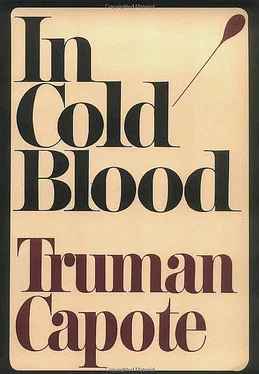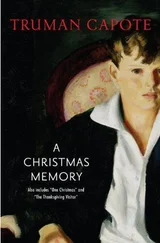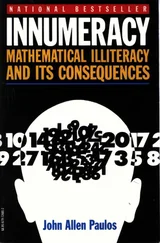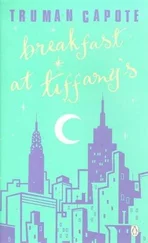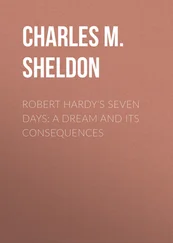physical, a matter of misplaced vertebrae. Of course, she must undergo an operation, and afterward—well, she would be her “old self” again. Was it possible—the tension, the withdrawals, the pillow-muted sobbing behind locked doors, all due to an out-of-order backbone? If so, then Mr. Clutter could, when addressing his Thanksgiving table, recite a blessing of unmarred gratitude.
Ordinarily, Mr. Clutter’s mornings began at six-thirty; clanging milk pails and the whispery chatter of the boys who brought them, two sons of a hired man named Vie Irsik, usually roused him. But today he lingered, let Vie Irsik’s sons come and leave, for the previous evening, a Friday the thirteenth, had been a tiring one, though in part exhilarating. Bonnie had resurrected her “old self”; as if serving up a preview of the normality, the regained vigor, soon to be, she had rouged her lips, fussed with her hair, and, wearing a new dress, accompanied him to the Holcomb School, where they applauded a student production of Tom Sawyer, in which Nancy played Becky Thatcher. He had enjoyed it, seeing Bonnie out in public, nervous but nonetheless smiling, talking to people, and they both had been proud of Nancy; she had done so well, remembering all her lines, and looking, as he had said to her in the course of backstage congratulations, “Just beautiful, honey—a real Southern belle.” Whereupon Nancy had behaved like one; curtsying in her hoop-skirted costume, she had asked if she might drive into Garden City. The State Theatre was having a special, eleven-thirty, Friday-the-thirteenth “Spook Show,” and all her friends were going. In other circumstances Mr. Clutter would have refused. His laws were laws, and one of them was: Nancy—and Kenyon, too—must be home by ten on week nights, by twelve on Saturdays. But weakened by the genial events of the evening, he had consented. And Nancy had not returned home until almost two. He had heard her come in, and had called to her, for though he was not a man ever really to raise his voice, he had some plain things to say to her, statements that concerned less the lateness of the hour than the youngster who had driven her home—a school basketball hero, Bobby Rupp.
Mr. Clutter liked Bobby, and considered him, for a boy his age, which was seventeen, most dependable and gentlemanly; however, in the three years she had been permitted “dates,” Nancy, popular and pretty as she was, had never gone out with anyone else, and while Mr. Clutter understood that it was the present national adolescent custom to form couples, to “go steady” and wear “engagement rings,” he disapproved, particularly since he had not long ago, by accident, surprised his daughter and the Rupp boy kissing. He had then suggested that Nancy discontinue “seeing so much of Bobby,” advising her that a slow retreat now would hurt less than an abrupt severance later—for, as he reminded her, it was a parting that must eventually take place. The Rupp family were Roman Catholics, the Clutters, Methodist—a fact that should in itself be sufficient to terminate whatever fancies she and this boy might have of some day marrying. Nancy had been reasonable—at any rate, she had not argued—and now, before saying good night, Mr. Clutter secured from her a promise to begin a gradual breaking off with Bobby.
Still, the incident had lamentably put off his retiring time, which was ordinarily eleven o’clock. As a consequence, it was well after seven when he awakened on Saturday, November 14,1959. His wife always slept as late as possible. However, while Mr. Clutter was shaving, showering, and outfitting himself in whipcord trousers, a cattleman’s leather jacket, and soft stirrup boots, he had no fear of disturbing her; they did not share the same bedroom. For several years he had slept alone in the master bedroom, on the ground floor of the house—a two-story, fourteen room, frame-and-brick structure. Though Mrs. Clutter Stored her clothes in the closets of this room, and kept her few cosmetics and her myriad medicines in the blue-tile-and-glass-brick bathroom adjoining it, she had taken for serious occupancy Eveanna’s former bedroom, which, like Nancy’s and Kenyon’s rooms, was on the second floor.
The house—for the most part designed by Mr. Clutter, who thereby proved himself a sensible and sedate, if not notably decorative, architect—had been built in 1048 for forty thousand dollars. (The resale value was now sixty thousand dollars.) Situated at the end of a long, lane like driveway shaded by rows of Chinese elms, the handsome white house, standing on an ample lawn of groomed Bermuda grass, impressed Holcomb; it was a place people pointed out. As for the interior, there were spongy displays of liver-colored carpet intermittently abolishing the glare of varnished, resounding floors; an immense modernistic living-room couch covered in nubby fabric interwoven with glittery strands of silver metal; a breakfast alcove featuring a banquette upholstered in blue-and-white plastic. This sort of furnishing was what Mr. and Mrs. Clutter liked, as did the majority of their acquaintances, whose homes, by and large, were similarly furnished.
Other than a housekeeper who came in on weekdays, the Clutters employed no household help, so since his wife’s illness and the departure of the elder daughters, Mr. Clutter had of necessity learned to cook; either he or Nancy, but principally Nancy, prepared the family meals. Mr. Clutter enjoyed the chore, and was excellent at it—no woman in Kansas baked a better loaf of salt-rising bread, and his celebrated coconut cookies were the first item to go at charity cake sales—but he was not a hearty eater; unlike his fellow ranchers, he even preferred Spartan breakfasts.
That morning an apple and a glass of milk were enough for him; because he touched neither coffee or tea, he was accustomed to begin the day on a cold stomach. The truth was he opposed all stimulants, however gentle. He did not smoke, and of course he did not drink; indeed, he had never tasted spirits, and was inclined to avoid people who had—a circumstance that did not shrink his social circle as much as might be supposed, for the center of that circle was supplied by the members of Garden City’s First Methodist Church, a congregation totaling seventeen hundred, most of whom were as abstemious as Mr. Clutter could desire. While he was careful to avoid making a nuisance of his views, to adopt outside his realm an externally un-censoring manner, he enforced them within his family and among the employees at River Valley Farm. “Are you a drinking man?” was the first question he asked a job applicant, and even though the fellow gave a negative answer, he still must sign a work contract containing a clause that declared the agreement instantly void if the employee should be discovered “harboring alcohol.” A friend—an old pioneer rancher, Mr. Lynn Russell—had once told him, “You’ve got no mercy. I swear, Herb, if you caught a hired man drinking, out he’d go. And you wouldn’t care if his family was starving.” It was perhaps the only criticism ever made of Mr. Clutter as an employer. Otherwise, he was known for his equanimity, his charitableness, and the fact that he paid good wages and distributed frequent bonuses; the men who worked for him—and there were sometimes as many as eighteen—had small reason to complain.
After drinking the glass of milk and putting on a fleece-lined cap, Mr. Clutter carried his apple with him when he went out-doors to examine the morning. It was ideal apple-eating weather; the whitest sunlight descended from the purest sky, and an easterly wind rustled, without ripping loose, the last of the leaves on the Chinese elms. Autumns reward western Kansas for the evils that the remaining seasons impose: winter’s rough Colorado winds and hip-high, sheep-slaughtering snows; the slushes and the strange land fogs of spring; and summer, when even crows seek the puny shade, and the tawny infinitude of wheat stalks bristle, blaze. At last, after September, another weather arrives, an Indian summer that occasionally endures until Christmas. As Mr. Clutter contemplated this superior specimen of the season, he was joined by a part-collie mongrel, and together they ambled off toward the livestock corral, which was adjacent to one of three barns on the premises.
Читать дальше
